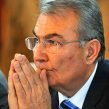
Opposition Rejects Gul’s Call for Consensus on the Kurdish Question
Publication: Eurasia Daily Monitor Volume: 6 Issue: 96
By:

Turkey’s President Abdullah Gul sparked another debate on the Kurdish question, following his recent statement that he is hopeful that a peaceful solution to the Kurdish problem might be imminent. Yet, Gul’s call to address the Kurdish question within the context of improving the country’s democratic practices, encountered resistance from an opposition increasingly skeptical about his policies.
Gul has played an active role in pushing for a democratic solution to the Kurdish issue. In early May, he held discussions with the leaders of the opposition parties. Last week, he maintained that there was a "historic opportunity" before the country to solve the Kurdish issue, adding that Turkey should exploit this opportunity. He called on the opposition parties to play a constructive role toward its resolution (www.ntvmsnbc.com, May 9). Gul’s remarks came amidst reports that the government was working on a new plan to achieve a breakthrough on the Kurdish question. Earlier, the PKK’s acting leader Murat Karayilan, also called for new initiatives and claimed that its views had also changed (EDM, May 7).
The opposition parties criticized Gul for leaving the meaning of "historic opportunity" open to interpretation. The leader of the Republican People’s Party (CHP), Deniz Baykal, argued that the government’s policies have thus far failed to quell the PKK’s violent campaign. Baykal maintained that the search for a solution, especially the discussions over a general amnesty, was imposed externally. He alleged that the United States and other powers were pressuring Turkey to solve the Kurdish problem, and that President Gul and the government simply responded to this coercion (www.showtvnet.com, May 12). Devlet Bahceli, the leader of the Nationalist Action Party (MHP), also lambasted Gul and Prime Minister Recep Tayyip Erdogan, arguing that the projects currently under consideration might betray the country’s national interests. "For what reason are Gul and the government asking us to contribute? What is the common ground on which they agreed?" Bahceli asked (Milliyet, May 13).
Before his departure for Syria on May 15, Gul told reporters that "there are comprehensive and a well-intentioned effort in Turkey… the country is an open society, and very lively and civilized debates are taking place" (www.nethaber.com, May 15). During his three-day visit to Syria, Gul held a discussion with Turkish journalists in Damascus where he further clarified his opinions on how to resolve the Kurdish question (Zaman, Aksam, Todays’ Zaman, May 18).
Those present interpreted Gul’s meaning of "historic opportunity" to involve a combination of domestic, regional and global factors to facilitate solving the issue. First, Gul argued that a consensus already exists within the state, both on the need as well as the means to address the Kurdish question. "I have been part of the state machinery for 10 years. I am optimistic more than ever. There is a new consensus and close coordination between the civilian and military branches." He also pointed to the PKK and pro-Kurdish Democratic Society Party (DTP) incrementally rescinding their demands for an independent state in south-eastern Turkey.
In addition to these positive domestic developments, Gul also believes that global and regional factors currently favor addressing the Kurdish issue. He points out that the Kurdistan Regional Government (KRG) in Northern Iraq is actively cooperating with Turkey, while global actors are also promoting the search for a solution. These factors create a unique historical opportunity, which he considers that Turkey must seize immediately.
Gul avoided engaging in a polemic with the leaders of the opposition parties, but indirectly responded to their criticisms. He described the Kurdish issue as a deep-rooted problem that goes beyond daily politics and argued that all political actors are stakeholders in its resolution. Gul noted that the responsibility for finding the solution cannot be left to the government alone, and that all political parties should contribute constructively.
Gul’s comments in Syria, far from answering questions, served to reignite the debate on his vision for a solution. The representatives of the pro-Kurdish DTP welcomed Gul’s remarks. Although they wanted more detail on Gul’s plans, they commended him for making a valuable effort. Such discussions, DTP sources maintained, might provide the basis for debating more concrete proposals (ANKA, May 18). Yet, the representatives of the MHP and CHP harshly condemned Gul. One CHP official criticized Gul for keeping his views so vague and argued that as the head of state, he must openly inform the public (www.ntvmsnbc.com, May 18). An MHP spokesman said Gul was acting as the proxy of the government in seeking to solicit opposition approval for policies agreed behind closed doors (ANKA, May 18).
Gul has attempted since his election to shape the country’s domestic and foreign policies, as in the case of the Kurdish issue and rapprochement with Armenia. However, according to his critics, this role goes beyond his presidential functions. Gul legitimizes his active involvement in politics by presenting his actions as "non-partisan" and claims that he acts as a unifying figure to promote solutions to urgent national problems. However, he has failed to achieve a consensus among the opposition over the government’s policy on the Kurdish issue. The opposition still views him as an extension of the government, while fearing that his efforts to resolve this issue might undermine the territorial integrity of the country. Gul and the government are unlikely to gain the full backing of the opposition parties, unless these concerns are adequately addressed.




